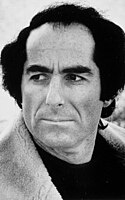Philip Roth Quote
This place where she worked certainly didn't make it look as if she continued to believe her calling was to change the course of American history. The building's rusted fire escape would just come down, just come loose from its moorings and crash onto the street, if anyone stepped on it - a fire escape whose function was not to save lives in the event of a fire but to uselessly hang there testifying to the immense loneliness inherent to living. For him it was stripped of any other meaning - no meaning could make better use of that building. Yes, alone we are, deeply alone, and always, in store for us, a layer of loneliness even deeper. There is nothing we can do to dispose of that. No, loneliness shouldn't surprise us, as astonishing to experience it as it may be. You can try turning yourself inside out, but all you are then is inside out and lonely instead of inside in and lonely. My stupid, stupid Merry dear, stupider even than your stupid father, not even blowing up buildings helps. It's lonely if there are buildings and it's lonely if there are no buildings. There is no protest to be lodged against loneliness - not all the bombing campaigns in history have made a dent in it. The most lethat of manmade explosives can't touch it. Stand in awe not of Communism, my idiot child, but of ordinary, everyday loneliness. On May Day go out and march with your friends to its greater glory, the superpower of superpowers, the force that overwhelms all. Put your money on it, bet on it, worship it - bow down in submission not to Karl Marx, my stuttering, angry, idiot child, not to Ho Chi-Minh and Mao Tse-tung - bow down to the great god of Loneliness!
This place where she worked certainly didn't make it look as if she continued to believe her calling was to change the course of American history. The building's rusted fire escape would just come down, just come loose from its moorings and crash onto the street, if anyone stepped on it - a fire escape whose function was not to save lives in the event of a fire but to uselessly hang there testifying to the immense loneliness inherent to living. For him it was stripped of any other meaning - no meaning could make better use of that building. Yes, alone we are, deeply alone, and always, in store for us, a layer of loneliness even deeper. There is nothing we can do to dispose of that. No, loneliness shouldn't surprise us, as astonishing to experience it as it may be. You can try turning yourself inside out, but all you are then is inside out and lonely instead of inside in and lonely. My stupid, stupid Merry dear, stupider even than your stupid father, not even blowing up buildings helps. It's lonely if there are buildings and it's lonely if there are no buildings. There is no protest to be lodged against loneliness - not all the bombing campaigns in history have made a dent in it. The most lethat of manmade explosives can't touch it. Stand in awe not of Communism, my idiot child, but of ordinary, everyday loneliness. On May Day go out and march with your friends to its greater glory, the superpower of superpowers, the force that overwhelms all. Put your money on it, bet on it, worship it - bow down in submission not to Karl Marx, my stuttering, angry, idiot child, not to Ho Chi-Minh and Mao Tse-tung - bow down to the great god of Loneliness!
Related Quotes
About Philip Roth
Roth was one of the most honored American writers of his generation. He received the National Book Critics Circle award for The Counterlife, the PEN/Faulkner Award for Operation Shylock, The Human Stain, and Everyman, a second National Book Award for Sabbath's Theater, and the Pulitzer Prize for American Pastoral. In 2005, the Library of America began publishing his complete works, making him the second author so anthologized while still living, after Eudora Welty. Harold Bloom named him one of the four greatest American novelists of his day, along with Cormac McCarthy, Thomas Pynchon, and Don DeLillo. In 2001, Roth received the inaugural Franz Kafka Prize in Prague.
